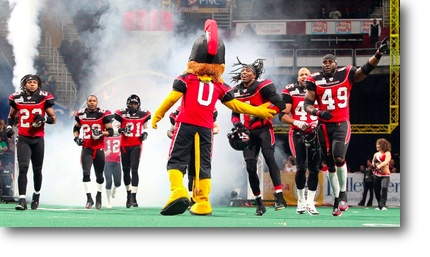
Cleveland fans’ hearts may be broken by upcoming labor disputes with their beloved Browns and Cavs. But the name Kurt Warner is a magical one to the players in the Arena Football League (AFL). His story is the ultimate dream-come-true tale that fuels the ambitions and hopes of the over 400 competitors who put on the pads each week for four months every spring and summer to play football, of all places, indoors.
In 1995 Warner was bagging groceries for $5.50 an hour in Cedar Rapids, Iowa, when the Iowa Barnstormers of the AFL signed him. He played with them until 1998 when he joined the St. Louis Cardinals of the NFL to begin a 13-year, Hall-of-Fame career in which he won two NFL Most Valuable Player awards, a Super Bowl title and MVP honor. His saga and that of Johnny Unitas going from the sandlots of Pittsburgh in the mid-1950s to football immortality, are the two greatest rags-to-riches stories in the history of the NFL.
And while it’s safe to say that visions of Warner dance in the minds of some of the Cleveland Gladiators who ply their trade at Quicken Loans Arena as one of the 18 teams that comprise the AFL, simply the chance to earn a modest living by playing a game you love is the fulfillment of a dream for most of the others.
According to Sean Wyatt, Media Relations Coordinator for the Gladiators who has worked in a number of capacities for both the Browns and the Cavs, dealing with the hungry and driven Gladiator players is markedly different than interacting with the highly paid, high-profile athletes in the NFL and NBA.
“The Gladiator players come from all over the country to stay here in Cleveland just for the chance to play professional football on this level,” says Wyatt. “They are put up in the same apartment complexes, travel together, eat together. They are a determined, tight-knit group – like a family, really.”
Wyatt, a 2009 graduate of Baldwin-Wallace with a degree in Sports Management, also feels a sense of connection with many on the team’s 24-man roster. “Most of these guys are around my age,” he notes. “I can relate to them. They are young and in the process of pursuing the dream of building a career in the sports world.”
That description would certainly fit Gladiators Troy Bergeron and Cliff Louis, who were signed, respectively, by the Dallas Cowboys and Arizona Cardinals after the 2010 season and are playing in the AFL because of the current NFL labor dispute. At the other end of the career spectrum is 32-year-old Tim Cheetwood, who played at Ohio State and has a successful career as a Cleveland-based personal trainer. And then there’s veteran quarterback John Dutton, who lives in Ethiopia in the off season where he works as a missionary for his own mission, Heavenly Hope Ministries.
Stories like these have been commonplace in the AFL since its founding in 1987. The league operated in semi-obscurity for a decade or so until it received a limited television contract in 2000 from TNN – partially due to the fame Kurt Warner was achieving in the NFL – and just last year a deal with the NFL Network was signed to broadcast arena games each week.
A major part of the AFL’s appeal is the dizzying, video-game feel of the contests. There are eight players on a side, allowing plenty of room for high-speed collisions. About 80 percent of the plays are passes and scores of 60 to 50 are not uncommon as the players careen wildly around the 50 yard-long fields. Rock music blares incessantly throughout the game as kickoffs are fielded off the giant screens in the end zones. Fans wrestle to keep the numerous footballs that find their way into the seats and receivers get running starts from the line of scrimmage and are often bounced into the laps of crowd members along the sidelines.
The Gladiators – now in their third season in Cleveland and averaging around 7,000 fans per game – feature a scantily-clad dance team, the Goddesses (who also serve as ticket agents), and the franchise prides itself on a very affordable, fan-friendly experience. Along with t-shirt giveaways and assorted contests, after each game tables are set up and all of the Gladiators and Goddesses are available for autograph sessions.
The Gladiators record stands at 4 and 2 following their victory last week over the Tulsa Talons. The playoffs are definitely in sight and there are still 12 games left on the schedule, starting with a game at The Q this Sat 5/6.
With both the Browns and the Cavaliers facing the possibility of their seasons being delayed or even canceled entirely because of labor standoffs between the owners and players (or, as some say, between the billionaires and the millionaires), Cleveland’s long suffering sports fans would be wise to take in some Gladiator games – where the blue-collar players are in it for the love of the game. And, of course, the maybe-just-maybe chance to be the next Kurt Warner.
[Photos by Woodard Photographic, Inc.]
 Larry Durstin is an independent journalist who has covered politics and sports for a variety of publications and websites over the past 20 years. He was the founding editor of the Cleveland Tab and an associate editor at the Cleveland Free Times. Durstin has won 12 Ohio Excellence in Journalism awards, including six first places in six different writing categories. LarryDurstinATyahoo.com
Larry Durstin is an independent journalist who has covered politics and sports for a variety of publications and websites over the past 20 years. He was the founding editor of the Cleveland Tab and an associate editor at the Cleveland Free Times. Durstin has won 12 Ohio Excellence in Journalism awards, including six first places in six different writing categories. LarryDurstinATyahoo.com
[Click here to return to the current issue of Cool Cleveland]

